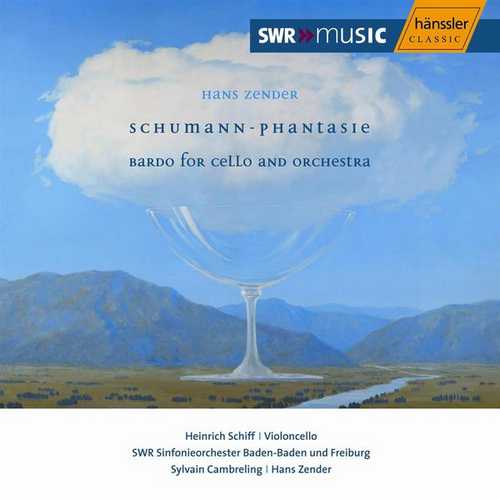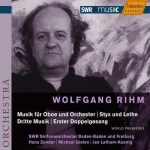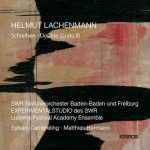
Composer: Hans Zender
Performer: Heinrich Schiff
Orchestra: SWR Sinfonieorchester des Südwestrundfunks
Conductor: Sylvain Cambreling, Hans Zender
Format: FLAC (tracks)
Label: Hänssler
Catalogue: HAEN93128
Release: 2007
Size: 273 MB
Recovery: +3%
Scan: cover
Schumann-Phantasie
01. Praludium
02. I. Ruinen (after Schumann: Fantasy in C Major, Op. 17: I. Durchaus phantastisch und leidenschaftlich vorgetragen)
03. Interludium I
04. II. Triumphbogen (after Schumann: Fantasy in C Major, Op. 17: II. Massig. Durchaus energisch)
05. Interludium II
06. III. Sternennacht (after Schumann: Fantasy in C Major, Op. 17: III. Langsam getragen. Durchweg leise zu halten)
Bardo
07. Solo I
08. Tutti I
09. Solo II
10. Tutti II
11. Solo III
12. Tutti III
13. Solo IV
14. Tutti IV
15. Solo V
16. Tutti V
The front cover image of Hänssler Classics’ Hans Zender: Schumann-Phantasie is a late Magritte that looks like a thrift store painting, consisting of a fluffy white cloud placed atop a large crystal goblet with a comparatively squat mountain range in the background. While the front cover looks like a master painting that would nonetheless look at home on the walls of Boston’s Museum of Bad Art, the disc inside utilizes a thrift store sensibility to reevaluate a great work of Romantic piano music, Robert Schumann’s C major piano Fantasie, Op. 17. Composer/conductor Hans Zender is heard in his cello concerto Bardo (1999) leading the SWR Symphony of Baden-Baden, while Zender’s lightly scored, yet large orchestral Schumann-Phantasie is led by Sylvain Cambreling with the SWR Symphony of Freiburg.
Bardo is the more interesting of the two works, given its frequent use of quarter-tones, employment of the quarter tone piano and its grounding in the Bardo Thodol (The Tibetan Book of the Dead), whose images Zender claims to have been visualizing in composing this work. Instead of the three-movement structure common to concerti, Zender has opted to create five pairs of solos and tutti that work in direct opposition to one another. The most effective part of Bardo is in the Tutti III, an extended section where the strings and clarinet glide around in quarter-tone complexes. It sounds a lot like a passage in the “comedy” Allegretto of Charles Ives’ Fourth Symphony, and you will wonder if Ives didn’t do it a little better, but it still pricks up one’s ears. Other promising quarter-tone moments are abruptly broken off to make room for typically violently agitated, mid-century contemporary music clichés, such as the snapping, “organizing” woodblock from Xenakis works as Pithoprakta and Akrata, definitely overdone here. Soloist Heinrich Schiff has his work cut out for him, and saws away mercilessly on his cello; at one point, Schiff makes a sound on his instrument that’s like someone dragging and slapping a wet head of lettuce along the surface of a washboard.
The recording quality of Schumann-Phantasie is significantly inferior to that of Bardo, even though only four months and two cities separate them; it is much quieter and lacking in dynamic presence in Freiburg. Zender writes, “We do not take evidence of our cultural past seriously until we can refer it to our contemporary feel for life …if we do not expose it to the shock of a direct confrontation with a modern entity, then we isolate it in the noncommittal domain of a museum where it can delight us without causing any problems.” Of all the self-important, post-modernist gobbledygook that has come out of European composers, this must take the cake — it is absolutely untrue that we MUST subject past masterworks to a “confrontation” with the language of modernism in order to take them “seriously.” The technique of modeling on or quoting older music in new is merely a technique, and one that goes back at least to Pérotin’s time — sometimes it works, sometimes it doesn’t.
It doesn’t work much of the time in Schumann-Phantasie, where Zender orchestrates Schumann’s C major piano Fantasie, Op. 17, inserts a prelude and two interludes, and then begins erasing away sections of his orchestration. Some interesting orchestral timbres emerge from this gradual subtraction of measures and instruments, but the interludes consist mostly of static chords with a few stray figures of the Schumann dropped in for good measure — listeners will find themselves looking at their watches. The work as a whole is underpowered and lacking in impact; though admittedly SWR’s anemic recording doesn’t help much. The best that can be said about Schumann-Phantasie is that it is neither as offensive nor annoying as Zender’s reinvention of Schubert’s Winterreise, where he added to the music rather than subtracted.
If Zender wants to write tonal music, he should do so, and not shoulder half the blame for the flopping of his cake in the oven with composers such as Schubert and Schumann simply because he derived some ingredients from them. One must admit, though, that as a disc there is no denying that Hänssler Classics’ Hans Zender: Schumann-Phantasie is thought provoking and, in a way, challenging, owing to its apparent wrong-headedness, seeming lack of relevance, and slavish devotion to the now prosaic devices of the post-World War II avant-garde. Does it matter? You be the judge.



